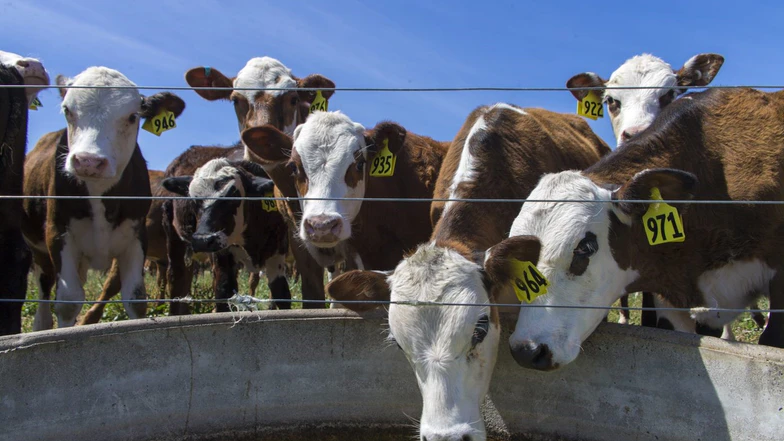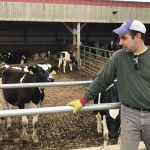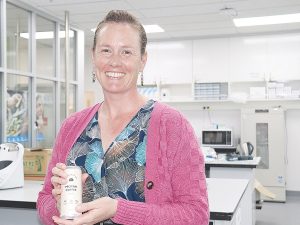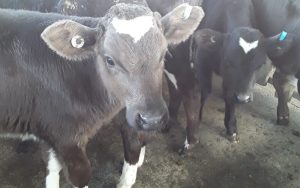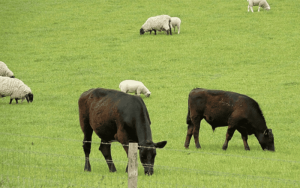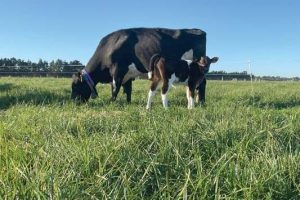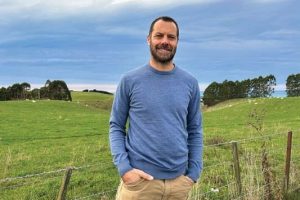
Calves are created for milk production in the dairy industry, with a large number being slaughtered from four days old.
“I see that as an opportunity to create a higher value product, to make use of those animals,” Massey University animal science senior lecturer Dr Nicola Scheurs said.
The concept she has created, with the help of Masters students, is dubbed New Generation Beef.
The project saw 80 Kiwi Hereford cross calves reared to eight, 10 and 12 months old, a year to two years earlier than the usual processing age.
Testing has shown the result is less fatty and more tender lean beef.
“It has positive outcomes in terms of the welfare of that calf. At a year of age they are able to walk through yards, they are able to walk onto a truck, they have to walk through the processing facilities, it’s a very low stress system in terms of processing,” Dr Scheurs said.
“Good welfare equals good quality product.”
The cattle causes less impact on the environment, than if they were processed at two years old.
“It’s really important to be looking at some of those holistic systems and thinking about new innovative products to make sure our sector is sustainable,” Massey University Masters student Sam Pike said.
Mr Pike said the product was popular with even the toughest critics at this year’s Fieldays.
“Initially they were a bit sceptical that maybe because it has less fat it may have less flavour, but they were really surprised at how well the flavour came across and how tender the meat was,” he said.
This year, more than 1.76 million calves were slaughtered at meat works, up from 1.17 million calves last year, according to the Ministry for Primary Industries.
Deaths from the time a calf leaves a farm until slaughter have decreased from 0.25 per cent in 2016, to 0.043 per cent in 2019, the agency said.
Dr Scheurs said the processing of bobby calves could be a trade barrier for New Zealand in the future due to consumer preference.
“We export basically 95 per cent of all the meat that we produce in New Zealand. So our consumers are overseas and they’re concerned about the environment, they’re concerned about ethical production, they want the animals to be happy and healthy and have had a lifetime, had a lifespan.
“In terms of being able to promote our products under the New Zealand label, we might want to be thinking about not just being good on a global scale, but going beyond good,” Dr Scheurs said.
Dr Scheurs and other researchers are now promoting the product to industry groups to help take it to market.
There are several logistical challenges to sort including suitable processing facilities, who will rear and finish the calves, where the milk they’re fed will come from and what land they’ll live on.
There would not be enough available land for all calves to be reared to a year so other initiatives such as extending lactation periods are needed, Dr Schuers said.
“We’d have to look at reducing cow stocking rate as well just in order to produce less calves,” she said.
Dairy New Zealand said it couldn’t answer whether bobby calf processing could be a trade barrier in the future.
“The challenge of bobby claves is not unique to New Zealand. And if we look at our wider welfare system, it’s regarded as one of the best in the world. And as farmers and a wider industry, we’re really proud of that,” Dairy NZ’s Dr Jenny Jago said.
Dr Jago said farmers would be interested in hearing about the New Generation Beef research and said the representative group is considering how the concept could help farmers reduce the number of bobby calves.
“We’re really supportive of the work and look forward to seeing how it progresses,” she said.
Animals rights group SAFE chief executive Debra Ashton said the concept was “business as usual” with little difference for cattle dying a lot earlier than their natural lifespan.
“We need to be reducing dairy and we’d really like to see research in innovation and development going into helping farmers transition away from dairying rather than extending the practice of dairying,” Ms Ashton said.
